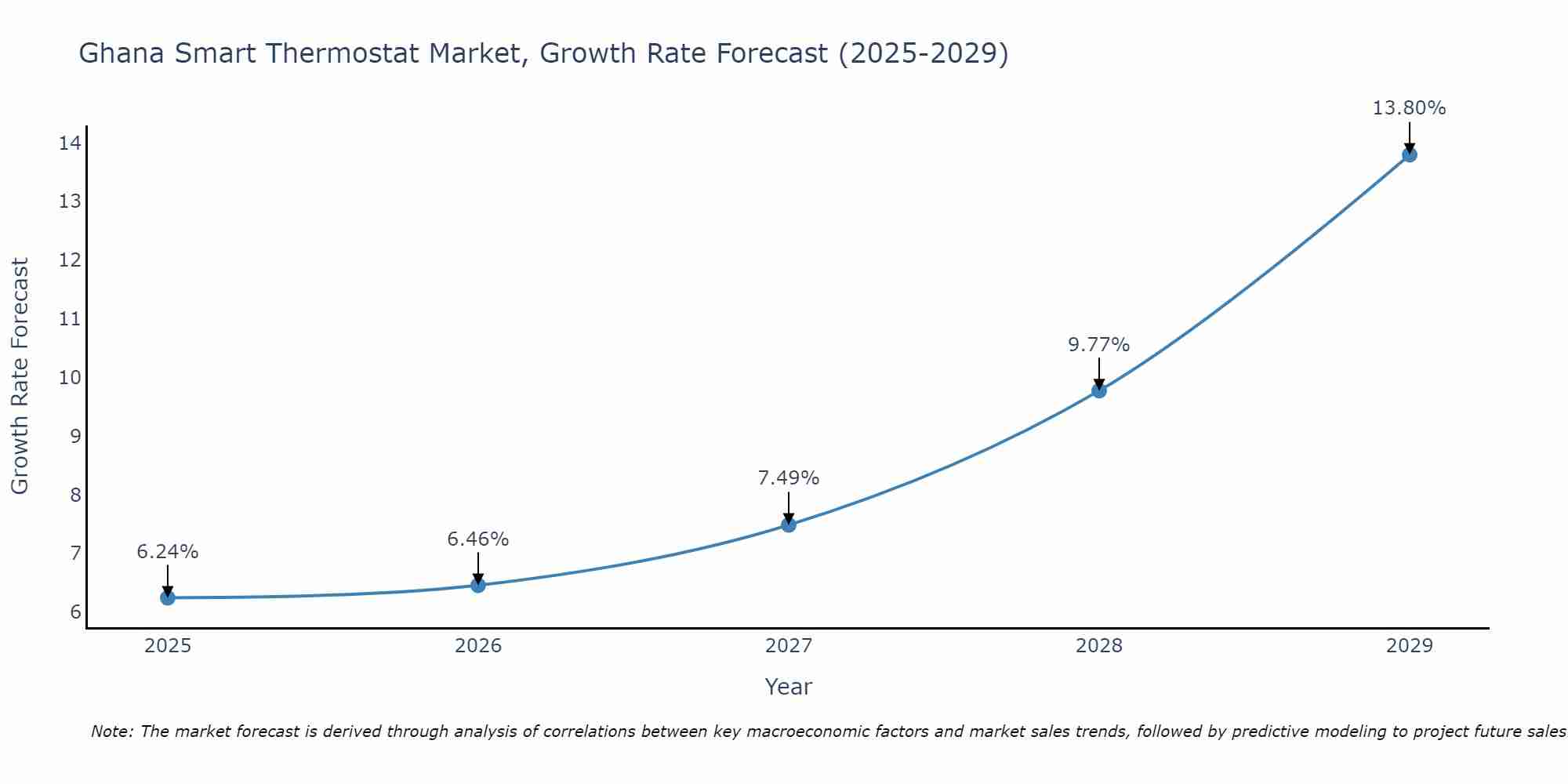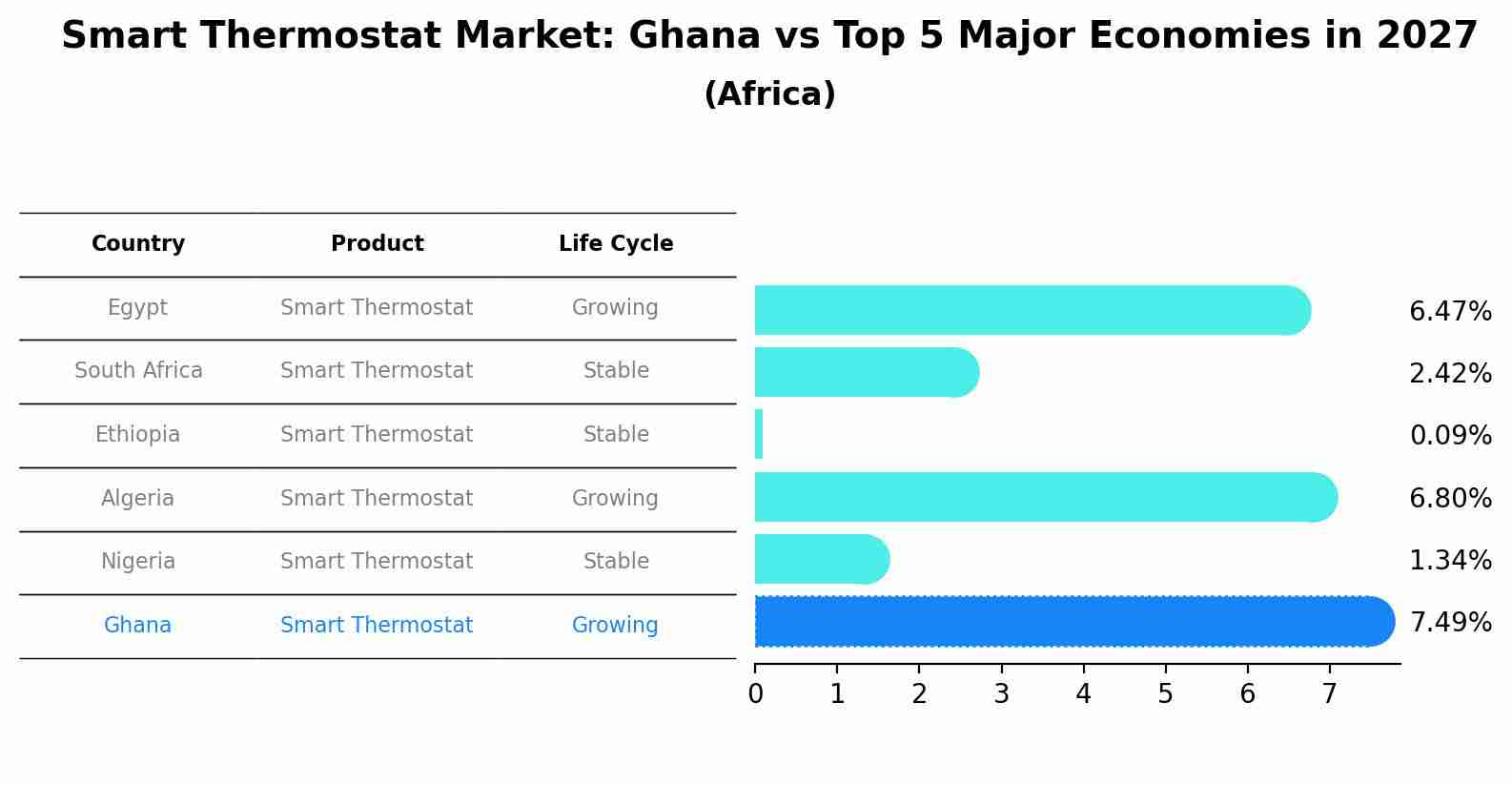Ghana Smart Thermostat Market (2025-2031) Outlook | Share, Forecast, Trends, Size, Revenue, Companies, Industry, Analysis, Growth & Value
| Product Code: ETC369536 | Publication Date: Aug 2022 | Updated Date: Jul 2025 | Product Type: Market Research Report | |
| Publisher: 6Wresearch | Author: Sumit Sagar | No. of Pages: 75 | No. of Figures: 35 | No. of Tables: 20 |
Ghana Smart Thermostat Market Size Growth Rate
The Ghana Smart Thermostat Market is poised for steady growth rate improvements from 2025 to 2029. Commencing at 6.24% in 2025, growth builds up to 13.80% by 2029.

Smart Thermostat Market: Ghana vs Top 5 Major Economies in 2027 (Africa)
The Smart Thermostat market in Ghana is projected to grow at a growing growth rate of 7.49% by 2027, highlighting the country's increasing focus on advanced technologies within the Africa region, where Egypt holds the dominant position, followed closely by South Africa, Ethiopia, Algeria and Nigeria, shaping overall regional demand.

Ghana Smart Thermostat Market Synopsis
The Ghana Smart Thermostat Market is witnessing steady growth driven by factors such as increasing awareness about energy efficiency, rising disposable income, and the government`s focus on promoting sustainable technology. Smart thermostats offer features like remote access, energy usage monitoring, and customization, which appeal to consumers looking to reduce energy bills and enhance convenience. The market is characterized by the presence of both international and local players offering a variety of products at different price points. Key players are focusing on product innovation, partnerships with utility companies, and marketing campaigns to expand their market share. With a growing emphasis on smart home technology and the need for energy conservation, the Ghana Smart Thermostat Market is expected to continue its growth trajectory in the coming years.
Ghana Smart Thermostat Market Trends
The Ghana Smart Thermostat Market is experiencing significant growth due to rising awareness about energy efficiency and the increasing adoption of smart home technologies. Consumers are increasingly looking for ways to reduce energy consumption and lower utility bills, driving the demand for smart thermostats that offer features such as remote temperature control, scheduling, and energy usage monitoring. Manufacturers are focusing on developing more advanced and user-friendly smart thermostat models to cater to the evolving needs of consumers. Additionally, partnerships between smart thermostat companies and energy providers are driving market growth by offering incentives for the installation of these devices. Overall, the Ghana Smart Thermostat Market is poised for continued expansion as more consumers recognize the benefits of smart home technologies in improving energy efficiency and overall comfort.
Ghana Smart Thermostat Market Challenges
In the Ghana Smart Thermostat Market, some challenges include limited awareness and understanding of smart thermostat benefits among consumers, high initial costs of smart thermostat devices which may deter widespread adoption, inconsistent electricity supply in certain regions affecting the functionality of smart thermostats, and the need for compatible infrastructure such as Wi-Fi connectivity for optimal performance. Additionally, the lack of standardized regulations and policies specific to smart thermostat technology in Ghana can hinder market growth and create uncertainties for both consumers and manufacturers. Overcoming these challenges would require education campaigns to increase awareness, strategic pricing strategies to make devices more affordable, investments in improving electricity infrastructure, and collaboration between stakeholders to establish clear guidelines and standards for smart thermostat usage in the country.
Ghana Smart Thermostat Market Investment Opportunities
The Ghana Smart Thermostat Market presents promising investment opportunities due to the growing demand for energy-efficient solutions in residential and commercial buildings. With the increasing focus on sustainability and cost savings, smart thermostats offer the ability to optimize energy consumption through features such as remote temperature control and learning algorithms. Investing in this market could be lucrative as the Ghanaian government is pushing for energy efficiency initiatives, creating a favorable environment for smart thermostat adoption. Additionally, the rise in smart home technology adoption among consumers further fuels the market potential. Collaborating with local distributors, manufacturers, or investing in innovative startups focused on smart thermostat technology can provide a competitive edge in this emerging market segment.
Jordan Agar Market Government Policies
In Ghana, the government has implemented various policies to promote the adoption of smart thermostats to enhance energy efficiency and reduce carbon emissions. One key policy is the National Energy Efficiency and Conservation Policy which aims to promote the use of energy-efficient technologies in households and businesses, including smart thermostats. Additionally, the Ministry of Energy has been working to create awareness about the benefits of smart thermostats through education and outreach programs. The government also offers incentives such as tax breaks and rebates to encourage consumers to invest in smart thermostat technology. Overall, these policies demonstrate Ghana`s commitment to promoting sustainable energy practices and driving the growth of the smart thermostat market in the country.
Ghana Smart Thermostat Market Future Outlook
The Ghana Smart Thermostat Market is expected to experience significant growth in the coming years due to increasing awareness of energy efficiency and the adoption of smart home technology. Factors such as rising disposable income, urbanization, and government initiatives promoting sustainable energy practices are driving the demand for smart thermostats in Ghana. Additionally, the growing trend of smart home automation and the need for remote access and control of home appliances are further fueling market growth. As technology continues to advance and become more affordable, consumers in Ghana are increasingly incorporating smart thermostats into their homes to save energy costs and enhance convenience. Overall, the Ghana Smart Thermostat Market is poised for expansion as consumers seek innovative solutions to improve their living spaces.
Key Highlights of the Report:
- Ghana Smart Thermostat Market Outlook
- Market Size of Ghana Smart Thermostat Market, 2024
- Forecast of Ghana Smart Thermostat Market, 2031
- Historical Data and Forecast of Ghana Smart Thermostat Revenues & Volume for the Period 2021 - 2031
- Ghana Smart Thermostat Market Trend Evolution
- Ghana Smart Thermostat Market Drivers and Challenges
- Ghana Smart Thermostat Price Trends
- Ghana Smart Thermostat Porter's Five Forces
- Ghana Smart Thermostat Industry Life Cycle
- Historical Data and Forecast of Ghana Smart Thermostat Market Revenues & Volume By Type for the Period 2021 - 2031
- Historical Data and Forecast of Ghana Smart Thermostat Market Revenues & Volume By Wireless for the Period 2021 - 2031
- Historical Data and Forecast of Ghana Smart Thermostat Market Revenues & Volume By Wireless for the Period 2021 - 2031
- Historical Data and Forecast of Ghana Smart Thermostat Market Revenues & Volume By End-User Vertical for the Period 2021 - 2031
- Historical Data and Forecast of Ghana Smart Thermostat Market Revenues & Volume By Residential for the Period 2021 - 2031
- Historical Data and Forecast of Ghana Smart Thermostat Market Revenues & Volume By Commercial for the Period 2021 - 2031
- Ghana Smart Thermostat Import Export Trade Statistics
- Market Opportunity Assessment By Type
- Market Opportunity Assessment By End-User Vertical
- Ghana Smart Thermostat Top Companies Market Share
- Ghana Smart Thermostat Competitive Benchmarking By Technical and Operational Parameters
- Ghana Smart Thermostat Company Profiles
- Ghana Smart Thermostat Key Strategic Recommendations
Frequently Asked Questions About the Market Study (FAQs):
- Single User License$ 1,995
- Department License$ 2,400
- Site License$ 3,120
- Global License$ 3,795
Search
Thought Leadership and Analyst Meet
Our Clients
Related Reports
- Canada Oil and Gas Market (2026-2032) | Share, Segmentation, Value, Industry, Trends, Forecast, Analysis, Size & Revenue, Growth, Competitive Landscape, Outlook, Companies
- Germany Breakfast Food Market (2026-2032) | Industry, Share, Growth, Size, Companies, Value, Analysis, Revenue, Trends, Forecast & Outlook
- Australia Briquette Market (2025-2031) | Growth, Size, Revenue, Forecast, Analysis, Trends, Value, Share, Industry & Companies
- Vietnam System Integrator Market (2025-2031) | Size, Companies, Analysis, Industry, Value, Forecast, Growth, Trends, Revenue & Share
- ASEAN and Thailand Brain Health Supplements Market (2025-2031) | Strategy, Consumer Insights, Analysis, Investment Trends, Opportunities, Growth, Size, Share, Industry, Revenue, Segments, Value, Segmentation, Supply, Forecast, Restraints, Outlook, Competition, Drivers, Trends, Demand, Pricing Analysis, Competitive, Strategic Insights, Companies, Challenges
- ASEAN Bearings Market (2025-2031) | Strategy, Consumer Insights, Analysis, Investment Trends, Opportunities, Growth, Size, Share, Industry, Revenue, Segments, Value, Segmentation, Supply, Forecast, Restraints, Outlook, Competition, Drivers, Trends, Demand, Pricing Analysis, Competitive, Strategic Insights, Companies, Challenges
- Europe Flooring Market (2025-2031) | Outlook, Share, Industry, Trends, Forecast, Companies, Revenue, Size, Analysis, Growth & Value
- Saudi Arabia Manlift Market (2025-2031) | Outlook, Size, Growth, Trends, Companies, Industry, Revenue, Value, Share, Forecast & Analysis
- Uganda Excavator, Crane, and Wheel Loaders Market (2025-2031) | Strategy, Consumer Insights, Analysis, Investment Trends, Opportunities, Growth, Size, Share, Industry, Revenue, Segments, Value, Segmentation, Supply, Forecast, Restraints, Outlook, Competition, Drivers, Trends, Demand, Pricing Analysis, Competitive, Strategic Insights, Companies, Challenges
- Rwanda Excavator, Crane, and Wheel Loaders Market (2025-2031) | Strategy, Consumer Insights, Analysis, Investment Trends, Opportunities, Growth, Size, Share, Industry, Revenue, Segments, Value, Segmentation, Supply, Forecast, Restraints, Outlook, Competition, Drivers, Trends, Demand, Pricing Analysis, Competitive, Strategic Insights, Companies, Challenges
Industry Events and Analyst Meet
Whitepaper
- Middle East & Africa Commercial Security Market Click here to view more.
- Middle East & Africa Fire Safety Systems & Equipment Market Click here to view more.
- GCC Drone Market Click here to view more.
- Middle East Lighting Fixture Market Click here to view more.
- GCC Physical & Perimeter Security Market Click here to view more.
6WResearch In News
- Doha a strategic location for EV manufacturing hub: IPA Qatar
- Demand for luxury TVs surging in the GCC, says Samsung
- Empowering Growth: The Thriving Journey of Bangladesh’s Cable Industry
- Demand for luxury TVs surging in the GCC, says Samsung
- Video call with a traditional healer? Once unthinkable, it’s now common in South Africa
- Intelligent Buildings To Smooth GCC’s Path To Net Zero


















